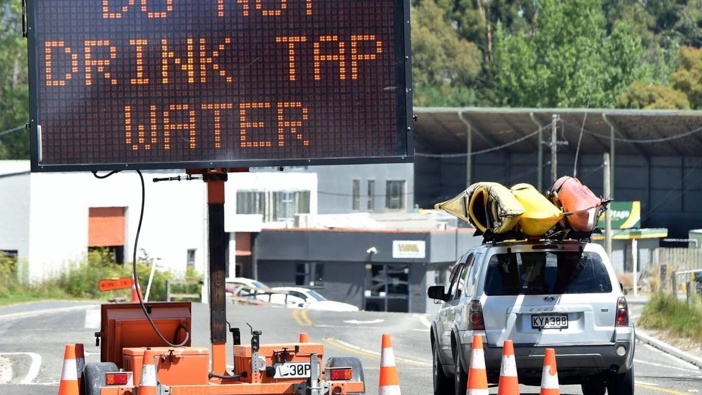Follow
the podcast on

Blood tests will be offered to Otago residents who drank water from lead-contaminated supplies as authorities scramble to contain a debacle.
The free tests next week are expected to help officials work out whether the Waikouaiti and Karitāne communities north of Dunedin have experienced chronic exposure to lead.
The response comes amid gaffes that have included an email to the Dunedin City Council remaining unopened for weeks, the council publicly under-estimating a high lead reading and council chief executive Sandy Graham being out of the loop until this week.
Recent spikes in lead levels were unlikely to have created a risk of acute toxicity, but it was not impossible, particularly for young children, Southern District Health Board medical officer of health Dr Susan Jack said.
Residents have been told not to drink the water since Tuesday, and Dr Jack has appealed for calm.
A public meeting will be held in Waikouaiti tonight amid growing anger about multiple bungles.
Last night, the council conceded a lead reading from a sample taken in December was almost 40 times the acceptable limit.
Council staff had initially said the reading was about four times the limit.
Authorities did not grasp the lead limit had been exceeded by such an extent until this week, Dr Jack conceded.
But officials have so far stood by their assertion intermittent elevated lead levels recorded since August — six exceeded the limit — did not warrant a notice advising against drinking the water until Tuesday.
It had become clear at that point water at the source could be contaminated, after an elevated lead reading at the Waikouaiti raw water reservoir.
The source of the contamination is not known.
It emerged yesterday Graham did not know about elevated lead readings until this week.
That was despite her organisation receiving information about the lead readings since August and one in December that was particularly high.
The high reading from a December 8 sample — 0.39mg/L, almost 40 times the limit — happened to be one result that was sent to the city council on December 18, but was not noticed until January 7 as a staff member had been on leave.
The council's communication problems were further exposed when Dunedin Mayor Aaron Hawkins learnt during a radio interview last night the December reading was 10 times worse than the council had said.
Hawkins conceded the council could have explained the issue better, but said fixing that would not have changed the public health response.
Hawkins said he believed the error was a "misstatement" by a staff member that he repeated.
He apologised for getting that wrong.
The council had followed the advice of public health, he said.
"There will be plenty of time for a review of everything that has happened up until this point, and that will be true of not just the city council but of all authorities involved in this.
"But the people we would want to be involved in the review process are currently focused on trying to fix the problem."
Testing was stepped up from last August and contributed to the problem at the reservoir being identified.
Council 3 Waters group manager Tom Dyer said the council had tested more broadly for lead at water treatment plants in December and January and all results came back clear.
In adults, high levels of lead can cause symptoms such as mood changes, nausea, diarrhoea and memory impairment.
In children, it can lead to symptoms such as vomiting and difficulty sleeping.
The Ministry of Health was concerned about the spikes in lead readings, a spokeswoman said.
"As a precaution, public health officials have arranged for the Dunedin City Council to provide tankered water to residents until authorities are satisfied the drinking water supply is safe.
"We are working to urgently set up community screening so people who live in Waikouaiti and Karitane can access free blood tests."
East Otago Health practice manager Jane Roberts said the practice had been inundated with calls since Tuesday.
She estimated that since lunchtime on Wednesday, 20 to 25 people had been referred to Dunedin for testing of lead levels in blood.
Test results usually took up to a week but had been fast-tracked and would be returned within 48 hours, she was told.
One reason for the blood testing is because testing the water for lead has not been carried out regularly. It is expected to reveal whether a longer-term problem exists.
Graham said the council and other bodies were dealing with unexplained, intermittent spikes and not a sustained period of elevated lead levels over a prolonged period.
She was first advised of elevated lead levels in the water late on Monday.
"I am understandably unhappy not to have known earlier, as I would have expected to have been fully briefed by DCC staff on an issue which potentially had community health implications," she said.
Being told the information would not have changed the council's response, but "an issue of this significance should have been brought to me far sooner".
"At this stage, my focus is on ensuring drinking water supply is restored to the affected communities, but I will be following up internally at the earliest appropriate time."
The public meeting will be held at the East Otago Events Centre in Waikouaiti from 7pm.
— Reporting by Grant Miller, Hamish MacLean and Emma Perry
Take your Radio, Podcasts and Music with you









